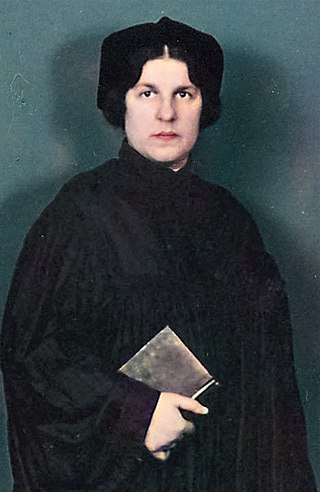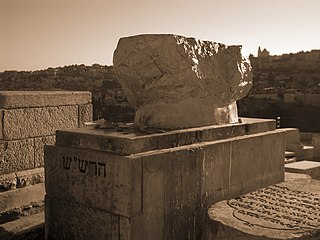Related Research Articles
The Rabbinical Assembly (RA) is the international association of Conservative rabbis. The RA was founded in 1901 to shape the ideology, programs, and practices of the Conservative movement. It publishes prayerbooks and books of Jewish interest, and oversees the work of the Committee on Jewish Law and Standards for the Conservative movement. It organizes conferences and coordinates the Joint Placement Commission of the Conservative movement. Members of the RA serve as rabbis, educators, community workers and military and hospital chaplains around the world.

A siddur is a Jewish prayer book containing a set order of daily prayers. The word siddur comes from the Hebrew root ס־ד־ר, meaning 'order.'
Julius Edwin Harlow was an American Conservative rabbi and liturgist.

Belz is a Hasidic dynasty founded in the town of Belz in Western Ukraine, near the Polish border, historically the Crown of the Kingdom of Poland. The group was founded in the early 19th century by Rabbi Shalom Rokeach, also known as the Sar Shalom, and led by his son, Rabbi Yehoshua Rokeach, and grandson, Rabbi Yissachar Dov, and great-grandson, Rabbi Aharon, before the Nazi invasion of Poland in 1939. While Aharon managed to escape Europe, together with his brother Rabbi Mordechai Rokeach, most of the Belz Hasidim were murdered in the Holocaust. Aharon re-established the Hasidic community in Israel following World War II. As of the 2020s, Belz has sizable communities in Israel, Western Europe, and the Anglosphere.

Regina Jonas was a Berlin-born Reform rabbi. In 1935, she became the first woman to be ordained as a rabbi. Jonas was murdered in the Holocaust.

Sar Shalom Sharabi, also known as the Rashash, the Shemesh or Ribbi Shalom Mizraḥi deyedi`a Sharabi (1720–1777), was a Yemenite Rabbi, Halachist, Chazzan and Kabbalist. In later life, he became the Rosh Yeshiva of Bet El Yeshiva in the Old City of Jerusalem. His daughter married Rabbi Hayyim Abraham Gagin of Jerusalem, making him the great-great-grandfather of Shem Tob Gaguine, the "Keter Shem Tob." His son was Yitzhak Mizrahi Sharabi and his grandson was Chief Rabbi Chaim Abraham Gagin.
Yedid Nefesh is the title of a piyyut and zemer. It is usually sung on Shabbat.
Siddur Sim Shalom refers to any siddur in a family of siddurim, Jewish prayerbooks, and related commentaries, published by the Rabbinical Assembly and the United Synagogue of Conservative Judaism.

Walter Jacob was an American Reform rabbi. He was rabbi at the Rodef Shalom Congregation in Pittsburgh from 1955 to 1997. He served as chairman of organizations such as the Central Conference of American Rabbis and World Union for Progressive Judaism. Jacob wrote a book, Christianity Through Jewish Eyes in 1974, leading to interfaith dialogue. He founded the Solomon B. Freehof Institute for Progressive Halakhah in 1991, an international forum for Jewish law. In Germany, he co-founded the Abraham Geiger College, the first rabbinic seminary in Central Europe since the Holocaust, in 1999.
Reuven Hammer was an American-Israeli Conservative rabbi, scholar of Jewish liturgy, author and lecturer who was born in New York. He was a founder of the "Masorti" (Conservative) movement in Israel and a president of the International Rabbinical Assembly. He served many years as head of the Masorti Beth Din in Israel. A prolific writer in both the Israeli and international press, he was a regular columnist for The Jerusalem Post's "Tradition Today" column. He lived in Jerusalem.
Nelly Shulman is the first female rabbi and author from Russia and was the first female rabbi in Belarus, having served as the chief reform rabbi of Minsk, Belarus. This makes her the first Russian-born woman to be a rabbi in the former Soviet Union. She was born in St. Petersburg, Russia, and received her rabbinical ordination at the Leo Baeck College in London in 1999. She was a rabbi in Belarus for five years, the first female rabbi to serve there. She later returned to Russia and worked as a rabbi in Moscow. She also became a founding member and rabbi for the World Union for Progressive Judaism in Russia. In 2006 she officiated at what is believed to be Russia's first Jewish same-sex commitment ceremony, which led to Russia's largest Jewish group, Federation of Jewish Communities of Russia, asking the Jewish Russian community to boycott Reform Jews.
Karen Soria is an American-born rabbi. She became the first female rabbi to serve in Australia when she joined the rabbinical team at Temple Beth Israel, a progressive Reform Jewish synagogue in Melbourne, in the 1980s. She later served as a chaplain for the U.S. Marines and the U.S. Navy; she was the first woman rabbi to serve in this capacity for the Marines, and the second in the Navy. After moving to Canada, she became the first woman rabbi to serve as a chaplain with the Canadian Forces.

The history of the Jews in Japan reaches back to the early 1700s.

Helen Levinthal (1910–1989) was a significant figure in the early history of the acceptance of Jewish women in the rabbinate.
Lynn Claire Feinberg is a Norwegian rabbi. She became the first female rabbi in Norway in 2009. She was born in Oslo. She is an adherent of Jewish Renewal, and is the founder and spiritual leader of Havurat Kol haLev, the first Jewish Renewal havurah in Oslo.
Michal Mendelsohn became the first presiding female rabbi in a North American congregation when she was hired by Temple Beth El Shalom in San Jose, California, in 1976.
Sybil Ann Sheridan is a writer and British Reform rabbi. She was chair of the Assembly of Reform Rabbis UK at the Movement for Reform Judaism from 2013 to 2015 and was Rabbi at Wimbledon and District Synagogue in south west London. As of 2020 she is part-time rabbi at Newcastle Reform Synagogue.
Steven Blane is an American rabbi, cantor and recording singer-songwriter.
This is a timeline of women rabbis:
Mark S. Golub was an American rabbi, media entrepreneur, television personality and educator. He created the television channel Jewish Broadcasting Service and the first Russian-language television channel produced in America, RTN. Golub was the rabbi of Chavurah Aytz Chayim, and the host of L'Chayim, a talk show he created in 1979 in which he interviewed prominent Jewish figures.
References
- ↑ "bet-debora.net" . Retrieved 29 October 2014.
- ↑ "Home" . Retrieved 29 October 2014.
- ↑ "History of Sim Shalom" . Retrieved 29 October 2014.
- ↑ "Introduction" . Retrieved 29 October 2014.
- ↑ "bet-debora.net" . Retrieved 29 October 2014.
- ↑ "Jewish Feminism in Post-Holocaust Germany" . Retrieved 29 October 2014.
